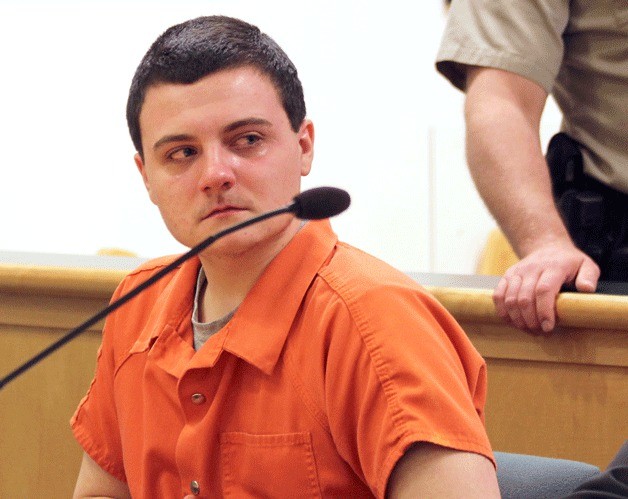For the first time, defendants accused of taking part in a conspiracy to murder an Oak Harbor teenager showed emotion in court about the tragedy they wrought.
Two of the four defendants charged in the 2015 shooting death of 17-year-old John “Jay” Johnson separately pleaded guilty in plea bargains during an emotional hearing in Island County Superior Court Friday and were immediately sentenced.
Derek Reeder, 17, was sentenced to a juvenile facility until he is 21 years old. Kitana Hernandez, 19, was sent to prison for three years.
They both wept as they were confronted in court by Johnson’s family and friends as well as their own.
Shari Mattson-Cooper, Johnson’s grandmother and guardian, asked the two defendants to look at her when she spoke. She told Hernandez that she doesn’t hate her, but hopes she will remember what another family lost every time she calls home.
She told Reeder that he needs counseling.
“You were welcome in my home,” she said. “You were welcome to my refrigerator. Jay thought you were one of his best buddies.”
Investigators and prosecutors believed the defendants, Derek Reeder and Kitana Hernandez, were the least culpable in the murder and deserved lesser sentences than the others.
David Nunez Jr., 20, pleaded guilty earlier in May to conspiracy to commit murder in the first degree with a firearms enhancement and was sentenced to 25 years in prison, likely the longest sentence of the four codefendants. He was upset with Johnson over a $400 impound fee; he hatched the plan to murder him and furnished the murder weapon.
Brian Rayford, 20, pleaded guilty to first-degree murder in February in a plea bargain. He was the shooter but agreed to testify against his codefendants. He was supposed to be sentenced Friday but it was postponed because of a communication mistake.
Under Rayford’s plea bargain, the prosecutor will recommend 24 years and three-and-a-half months in prison.
The four young people drove to Johnson’s North Whidbey house on the night of Nov. 10, 2015. Hernandez was driving. Rayford and Reeder got out of the car together; Rayford went to the door and had a short conversation with Johnson before shooting him in the head.
Johnson died at a Seattle hospital several days later.
Chief Criminal Prosecutor Eric Ohme told the judge that Detective Ed Wallace did a thorough investigation and interviewed Hernandez, but couldn’t find evidence that she knew that the young men planned to kill Johnson when she drove them there.
She did, however, help dispose of the gun afterward and didn’t come clean with police, Ohme said. She pleaded guilty to rendering criminal assistance in the first degree and agreed to an exceptional sentence of three years in prison.
Tears rolled down Hernandez’s cheeks as her mother addressed the courtroom, telling Johnson’s family members that she was very sorry for their loss and never made excuses for her daughter’s actions.
“I will forever love my daughter because that’s what you do when you’re a parent,” she said. “You have unconditional love.”
Ohme said there was limited evidence that Reeder was an active participant in the crime beyond what Rayford claimed. Together with his age, the prosecution decided to allow Reeder to plead guilty under the jurisdiction of juvenile court; he was originally charged as an adult.
“He was in a position in which he didn’t know exactly what was going to happen, but he knew something was going to happen,” said Reeder’s lawyer, David Carman.
Reeder pleaded guilty to conspiracy to commit murder in the first degree and agreed to a finding of manifest injustice, which allows the judge to sentence him beyond the standard range.
Judge Alan Hancock sentenced him to serve time in a juvenile detention facility until he’s 21, without the possibility of early release.
Reeder wept silently as Mattson-Cooper and a couple of his young friends addressed him in court. He told the court that he was sorry for the senseless act and that Johnson didn’t deserve it.
Hancock stressed the petty and cold-blooded nature of the murder. He noted that he knew Johnson from Drug Court and remembered him as “a delightful young man” in spite of a tough upbringing.
“He was a young man who was finding his way in life,” he said. “He was making positive steps in his life.”



